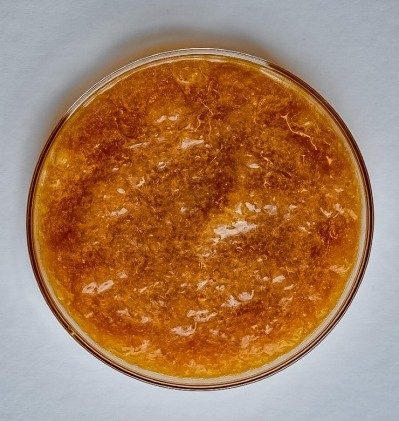
German start-up Bioweg claims its bio-based hydrocolloid made from bacterial cellulose can improve taste, texture, and appearance of plant-based meat and dairy alternatives.
It’s no secret that consumers want short, ‘clean’ ingredients lists. The COVID-19 pandemic served to advance this trend, as shoppers took a greater interest in ingredients lists.
According to market research firm Mintel, a ‘clean label’ is void of ingredients perceived to be artificial or unnatural. However, many additives in processed foods, such as plant-based meat and dairy alternatives, are perceived to be just that.
Additives such as sweeteners, aromas, colourants, and stabilizing agents are commonplace back-of-pack. And they each serve a purpose, whether it be to extend shelf-life or enhance flavour.
But as entrepreneur Prateek Mahalwar explained, such additives come with their challenges. Not only are consumers looking to avoid them, but mixing additives in certain combinations can lead to stability issues.
“Industry is using different ingredients for different properties. They may use an ingredient as a binder, one as an emulsifier, one for gelation, one as a bulking agent, and one as a thickener.”
“There is not one single ingredient providing total functionally, but multiple ingredients. And sometimes the final formulation is unstable.”
What if there was one single ingredient that could pretty much do it all? That is, an ingredient that could improve the taste, texture, sustainability and affordability of plant-based meat and dairy alternatives?
Mahalwar and co-founder Srinivas Karuturi believe they have found the solution: a bio-based hydrocolloid made from fermentation-derived cellulose (FDC).
A single ingredient with multiple properties
Mahalwar (CEO) and Karuturi (COO) established Bioweg in Quakenbrück, Germany, in 2019. The start-up is on a mission to disrupt ‘hyper processing’ in plant-based meat and dairy.
In food formulation, hydrocolloids are otherwise known as gelling agents. Both methylcellulose and carrageenan are hydrocolloids, for example.
Bioweg’s solution is a single ingredient with multiple properties. The bio-based hydrocolloid can be used for thickening, gelling, texture-creating, stabilising, and water-holding capacity which can help improve ‘juiciness’ in meat analogues.
It also increases a product’s dietary fibre content and when replacing multiple additives, can reduce overall calorie count.
It is stable over a wide range of pH and temperatures, as well as in freeze thaw conditions. It is also considered a nutritious and healthy ingredient, we were told, as a zero-calorie dietary fibre that can be used to replace fat. Further, it has cholesterol-reducing properties.
In plant-based meat and dairy alternatives, the ingredient promotes better texture and sensory mouthfeel, Mahalwar told FoodNavigator. It can also impart a ‘meaty’ colour in vegan substitutes. In beverages, it can create ‘colloidal suspension’ for stability, the CEO explained.
And finally, Bioweg’s hydrocolloid is sustainably sourced, non-GMO, and animal-input free.

Mahalwar observed a need for such an ingredient in the plant-based meat and dairy sectors. Food formulators are rapidly innovating to encourage their alt meat or dairy products to stand out from the crowd. “Everybody wants to develop an alternative that is better than the others,”
A plant-based burger prototype developed with Bioweg’s hydrocolloid presented with visible fibre and was ‘super juicy’ on the inside, we were told. A vegan mayonnaise prototype developed by the Bioweg team similarly produced pleasing results. All starch was replaced with the start-up’s hydrocolloid, allowing for a low-calorie, high-fibre product.
How the ingredient could feature on ingredients is not yet known, but Mahalwar suggested it could be listed as ‘fermentation-derived cellulose’.
A ‘circular economy’ process
Bioweg bacterial cellulose is produced via fermentation. The start-up has identified two new microorganism strains, that when fed with glucose in a bioreactor, produce a high yield of cellulose fibres.
“We isolated our strains in Germany and tested them to work out which is producing more cellulose. We then sequenced those selected strains and compared them to determine why some produce more than others,” the CEO explained.

The next step is to determine which side stream works best on which strain, and to test the conditions required, such as pH, temperature, and time ranges. “We have done thousands of experiments to understand the right condition and the right bacteria to get the best yield.”
The start-up is sourcing the carbohydrate source from food industry side streams, such as the sugar industry by-product molasses.
On top of the strain and fermentation processes, the start-up conducts ‘green chemistry’ to functionalise the material ‘within the scope of food’. This includes molecular simulations to know which other chemical groups could ‘bind’ to the ingredient, he explained.
The journey to commercialisation
One hurdle Bioweg will need to overcome before ‘cleaning up’ plant-based ingredients lists is regulation. While the bacterial strain in question is already known to the EU registry, Mahalwar expects its final product will be considered a Novel Food.
Achieving Novel Food authorisation can be a lengthy process. Whether the start-up applies alone, or in partnership with a food player, it could take up to 18-24 months. “I think we can reach the market in around one-and-a-half to two years,” we were told. Most of that time will be spent achieving Novel Food registration.
In the meantime, the start-up is preparing to scale thanks to recent funding from the European Innovation Council (EIC). A total of €12.6m of blended financing was awarded as blended finance (€2.5m grant and €10.1m equity funding).
Bioweg is not looking to work in food alone. Its first products to enter the market, similarly derived from bacterial cellulose, are targeting the cosmetics industry. The start-up has developed ingredients that can replace the use of solid and liquid microplastics in products such as face cream and shampoo.
The company is also diversifying into the agricultural sector, with a solution to replace acrylic polymer in seed coatings.


